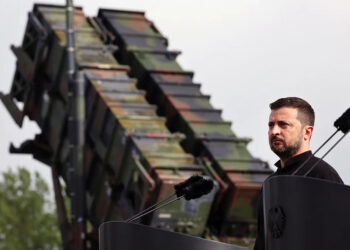If nothing changes, Georgia will become Belarus, – says Gennady Gudkov, former FSB officer, former State Duma deputy, and one of the few Russian politicians who publicly distanced himself from the Kremlin back in what he calls the “golden era” of Putin and Medvedev.
Branded a terrorist in his homeland, Gudkov now lives in exile. In this interview with RFE/RL s Georgian Service, he explains why he considers Georgian Dream an ally of the Kremlin, why Putin will never tolerate democracy next door, and why he believes that only unity among Georgians can save the country from becoming Russia’s next satellite.
“If Putin remains in power, he will eventually attack Armenia, Kazakhstan and Georgia.” – you write. Why would he attack Georgia, while Georgian Dream is still in charge?
Because any country that has a chance or a tendency to build democratic power is extremely dangerous for him. And Georgia right now is in a transitional state, between the past and the future. We’re seeing it start to move backwards, back toward authoritarian rule. And if Putin remains in power in the Kremlin, you must understand—he will not tolerate a world where he hasn’t defeated Ukraine, defeated NATO, defeated the entire democratic coalition. That’s how he defines victory in this war. Any territorial gain, any concession made to him, he sees it as victory. And after that victory, over Ukraine and the West, he will immediately begin consolidating control over the South Caucasus. Georgia. Armenia.
If Putin remains in power in the Kremlin, he will not tolerate a world where he hasn’t defeated Ukraine, NATO, and the entire democratic coalition
What will he do? First he’ll try peaceful means. The people in power in Georgia and Armenia must be his people, people who follow his orders.

Many would say that’s already happening.
Partially, yes. That’s the first method Putin uses: to dictate his will to those in power. If they refuse to carry out his will, they will be overthrown. It could be a coup, an armed uprising, orchestrated unrest, anything. If that doesn’t work, there will be war. Direct occupation.
And if they do follow orders?
Then he’ll help them stay in power for as long as possible. And under his instruction, they will build totalitarian regimes—in Georgia, in Armenia, and beyond. That’s already partially happening in Georgia.
Which brings us to an uncomfortable paradox: Georgian Dream says, “if we stay in power, there won’t be a war; if we lose, Russia will invade again.”
If they are Putin’s puppets and carry out all his instructions, there won’t be war. But Putin will still pursue his objectives by any means. Let me emphasize: Georgian Dream, under Putin’s direction, will lead Georgia into a totalitarian system, into human rights violations, bans on protests, bans on freedom of speech. There will be new prisons. There will be political prisoners. Elections will be abolished. Local governments will be dismantled. Civil society organizations eliminated. Georgia will become a totalitarian state. Everything that happened in Russia will be applied here—only faster.
You wrote that Ivanishvili is turning Georgia into a continuation of Putin’s Russia. What parallels do you see with the Russia of the 2000s?
There were mass protests in Russia back then—hundreds of thousands on the streets. But the authorities took a hardline approach. The same is happening in Georgia: protests are being broken up, people arrested, the foreign agents law was passed. More laws are coming. Next will be restrictions on rallies and demonstrations. Then will come laws on “undesirable organizations,” and so on.
The Kremlin sees Ivanishvili as a figure who yields under pressure, makes constant concessions, and is capable of carrying out Moscow’s will
Georgia must understand that Belarus has already gone down this road. Putin doesn’t need to send troops into Belarus anymore—he already controls it. He’s effectively occupied it. He stripped Belarus of its sovereignty, of its independence. The country has no agency left. Lukashenko now fully carries out Putin’s will.
Without resistance, Georgia will become Belarus. It’ll just turn into an extension of Belarus. There’ll be some local tsar who travels to the Kremlin for briefings, for orders, maybe even to receive subsidies.
Only unity among the Georgian people, only a clear pro-European direction, only strong international support can stop Putin.
How exactly can unity help?
If there is unity among the people, if their will is clear, and if it’s backed by Europe and the international community, then Putin will see that. If he sees hesitation, a divided population, some in support and some not, then he will pressure Georgia by any means necessary, to push it into totalitarianism.
Based on Kremlin statements about Georgian Dream, how is the party perceived in Moscow?
Georgian Dream is perceived as an ally of Putin. And Ivanishvili is considered a respected person in the Kremlin.
Respected like Lukashenko?
More or less, yes. Every ruler has their own style. But overall, the Kremlin sees Ivanishvili as a figure who yields under pressure, makes constant concessions, and is capable of carrying out Moscow’s will. And let’s not forget, there’s a lot of business involved. These people in the Kremlin, they’re about money. Not about principles, not about the people, not about the nation’s interests. Just money.
Since Ivanishvili is a businessman and an oligarch himself, I’m sure there’s more than just political cooperation involved. There are most likely serious business interests too.
How effective has the West been? Did they underestimate Ivanishvili the way they did Lukashenko?
Yes. Everyone underestimated him. Even your humble servant here thought Georgia, yes, with flaws and missteps, was still moving towards democracy. We all assumed the situation in Georgia was better than it is.
But I understand the issue. There is no serious negotiation process between Georgia and Europe. Ivanishvili doesn’t want one. And if he doesn’t want it, then the institutions—diplomats, parliaments, governments—don’t push it.
And that is the big problem. Because Georgia’s security, Armenia’s too, depends on strong alliances with the United States and Europe. Right now, probably more with Europe than the US. Only they can be the real guarantors of security in the Caucasus.
Interview by Vazha Tavberidze














